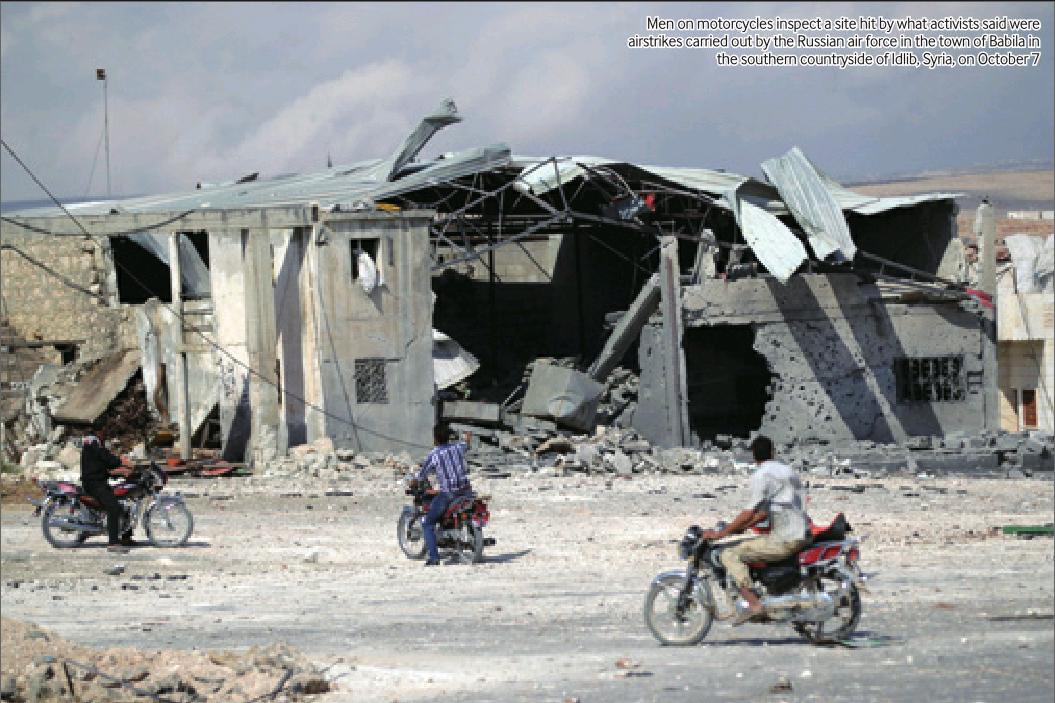The Syria Chessboard
By+Ma+Xiaolin

Russian support for Syrian President Bashar al-Assad turned to military action on the last day of September with the launch of airstrikes against Islamic State (ISIS) militants besieging al-Assads regime.
The Russian bombing campaign is the first military involvement beyond the boundaries of the former Soviet Union since the withdrawal from Afghanistan in 1989, and it brings a new variable to the already complicated situation in Syria and the countrys civil war.
The move follows on from the launch of airstrikes by the U.S.-led coalition a year ago that targeted ISIS in Iraq and Syria. Although the United States and Russia said their military action targets ISIS militants, apparently they support different sides in the Syrian conflict.
U.S. President Barack Obama has repeatedly urged al-Assad to hand over power to opposition groups. The United States has been offering aid and training to moderate Syrian opposition groups fighting against both the alAssad administration and ISIS militants.
Russia has made no attempt to hide the reason for its military involvement in Syria. Speaking on Russian TV recently, Russian President Vladimir Putin reaffirmed that the military operations aim to “stabilize the legitimate authority” of Syrian President Bashar al-Assad and “create conditions for a political compromise” in Syria.
Russia has deployed more than 50 strike aircraft. In a preliminary plan, Russian aircraft were due to fly 20 sorties a day on average to destroy IS targets, and the airstrikes will last for a month. Any follow-up action will depend on the outcome of the airstrikes in first month, Russia Today reported.
In the first week of the air campaign, Russian aircraft made 120 combat sorties and hit 110 targets, according to Russias Defense Ministry. The destroyed targets included more than 100 vehicles and about 50 facilities.
Missiles have also been launched from Russian warships in the Caspian Sea. Russian Defense Minister Sergey Shoygu announced on October 7 that four warships fired 26 sea-based cruise missiles at 11 ISIS targets, destroying them and causing no civilian casualties.
Russias action has made public the military support for President al-Assad that has been carried out secretly during the past four years.
Growing uncertainties
During the four-year conflict, Syria has been divided into several parts controlled by different factions. The ISIS militants occupy large areas of east Syria and north Iraq. The Kurdish militias control border areas of northeast Syria. Other opposition factions have taken over southern provinces of Syria. Al-Assads administration only holds the capital Damascus, the western coast and southwestern areas bordering Lebanon.
Under tough offensives from the ISIS group and Western-backed opposition rebels, the Syrian Governments forces had lost battlefield momentum and were only able to defend a number of big cities. So far, the al-Assad regime has lost 60,000 troops, amounting to 40 percent of its ground forces, as well as 20 percent of its air force.
The long-term sanctions imposed by the West and Arab world have deprived Syria of arms and resources. The army has grown tired and its morale is low. Consequently, the alAssad administration is unable to launch strong counterattacks to recover lost territory. The U.S. and Arab coalition expects to see the end of alAssads rule in the short run.
But Russias intervention offers timely help for al-Assad and might change the course of the conflict by enhancing the combat effectiveness of Syrian government forces, expanding the areas controlled by the Syrian Government and preventing them from being eroded by opposition rebels.
Russias interests
Syria is one of a few of Russias allies in the Middle East. Russia has a strategic interest in the country, reflected not only by the close trading ties but also Syrias importance as a buyer of Russian military hardware.
The harbor of Tartus, 220 km west of Damascus, is the Russian Navys only overseas military base. As early as 1971, the Soviet Union was allowed to use Tartus as a base for its Mediterranean fleet, following Hafiz al-Assads takeover of power in Syria. Despite the end of the Cold War, Russia has not abandoned its military presence at the port. From 2010 to 2012, Russia modernized and upgraded the facilities to accommodate cruisers and aircraft carriers. The strategic value of Tartus will remain important for Russia as long as it maintains a naval presence in the Black Sea and the Mediterranean.
Syria also forms part of the arc of the Shiite Islamic countries that includes Lebanon, Iraq and Iran. Maintaining a secular administration in Syria could help prevent radical Islamic groups from infiltrating Caucasian and Central Asian regions.
If al-Assad is overthrown by the Westernbacked opposition groups or the ISIS, Russia will lose a strategic foothold in the Middle East. Thus, Russia finally declared its military involvement as the situation in Syria became more perilous for the al-Assad administrations survival.
In order to carry out the airstrikes, Russia has transported equipment and personnel to Syria with the assistance of Greece, Iran and Iraq. Three Shiite-dominated West Asian countries—Syria, Iran and Iraq—have cooperated with Russia to enable the strategic action. The assistance Russia has received also suggests the Western coalition is not really unanimous on the Syrian crisis.
Four years ago, protests against the alAssad regime government erupted in Syria. These protests escalated to a civil war due to encouragement by the West and some Gulf states. Since that time, the United States and its allies have taken a tough stance, urging al-Assad to step down and viewing his departure from office as being the only way to solve the Syrian crisis.
Without Russias support for al-Assads regime, Syria would become the next Libya. Russia has exercised its veto at the UN Security Council when the West proposed establishing a no-fly zone in Syria and providing military aid to the opposition rebels.
For Syrias future, Russia calls on the govern- ment and opposition to reach a compromise and work together for a reorganization of the government. But Syrian opposition rebels, relying on the West, overestimate their strength and refuse to enter into peace talks. Radical Islamic groups have taken advantage of the stalemate on battlefield and increased their influence.
In recent months, the Unites States has offered more support for Syrian rebels fighting against the ISIS. Turkeys decision to join in the fight against the ISIS further weakens the sovereignty of Syria and initiatives by alAssad, although Turkeys main concern is the Kurdistan Workers Party. Given this backdrop, it is necessary for Russia to take action to support al-Assad and protect its strategic interests. In a wider sense, Russias involvement in Syria is a step toward helping itself change the unfavorable situation in Ukraine.
- Beijing Review的其它文章
- NUMBERS
- WORLD
- ECONOMY
- SOCIETY
- THIS WEEKWORLD
- HOTEL INFORMATION

